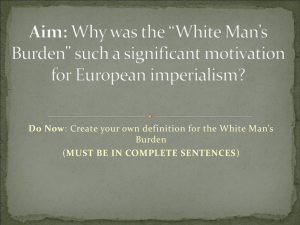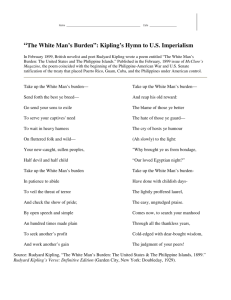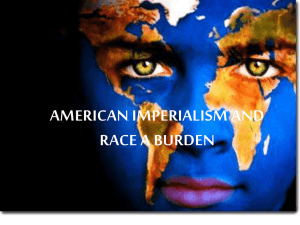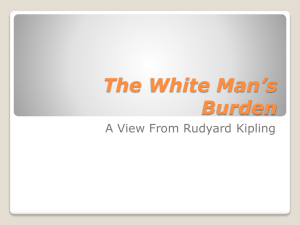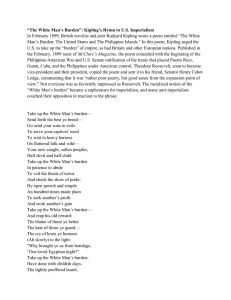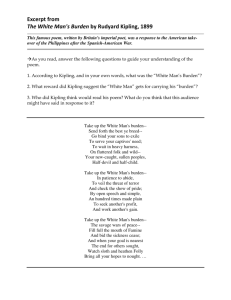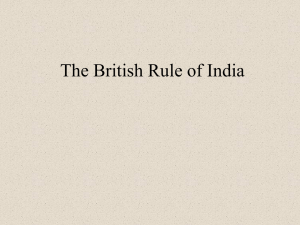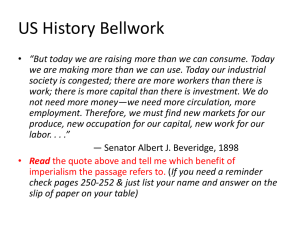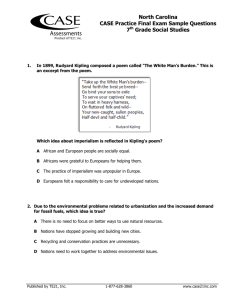"The White Man's Burden" Lesson Plan: Imperialism & POV Analysis
advertisement
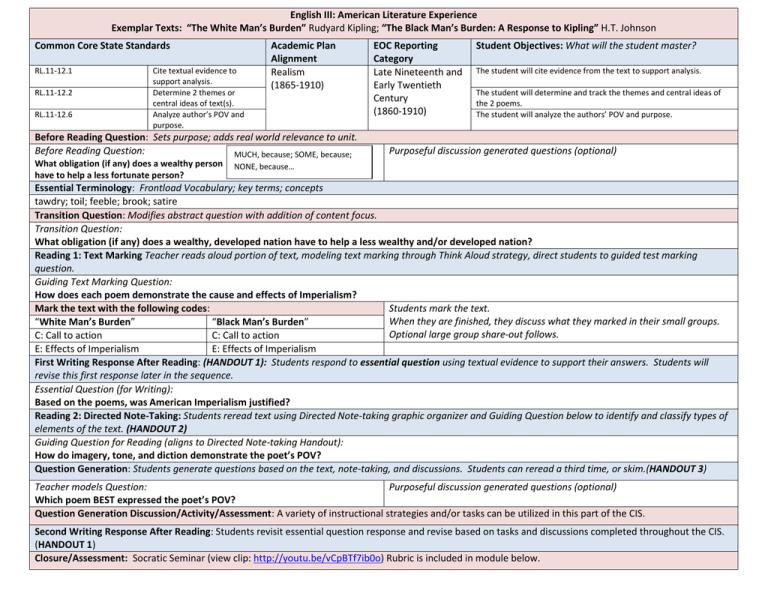
English III: American Literature Experience Exemplar Texts: “The White Man’s Burden” Rudyard Kipling; “The Black Man’s Burden: A Response to Kipling” H.T. Johnson Common Core State Standards RL.11-12.1 RL.11-12.2 RL.11-12.6 Cite textual evidence to support analysis. Determine 2 themes or central ideas of text(s). Analyze author’s POV and purpose. Academic Plan Alignment Realism (1865-1910) Before Reading Question: Sets purpose; adds real world relevance to unit. Before Reading Question: MUCH, because; SOME, because; What obligation (if any) does a wealthy person have to help a less fortunate person? EOC Reporting Category Late Nineteenth and Early Twentieth Century (1860-1910) Student Objectives: What will the student master? The student will cite evidence from the text to support analysis. The student will determine and track the themes and central ideas of the 2 poems. The student will analyze the authors’ POV and purpose. Purposeful discussion generated questions (optional) NONE, because… Essential Terminology: Frontload Vocabulary; key terms; concepts tawdry; toil; feeble; brook; satire Transition Question: Modifies abstract question with addition of content focus. Transition Question: What obligation (if any) does a wealthy, developed nation have to help a less wealthy and/or developed nation? Reading 1: Text Marking Teacher reads aloud portion of text, modeling text marking through Think Aloud strategy, direct students to guided test marking question. Guiding Text Marking Question: How does each poem demonstrate the cause and effects of Imperialism? Mark the text with the following codes: Students mark the text. When they are finished, they discuss what they marked in their small groups. “White Man’s Burden” “Black Man’s Burden” Optional large group share-out follows. C: Call to action C: Call to action E: Effects of Imperialism E: Effects of Imperialism First Writing Response After Reading: (HANDOUT 1): Students respond to essential question using textual evidence to support their answers. Students will revise this first response later in the sequence. Essential Question (for Writing): Based on the poems, was American Imperialism justified? Reading 2: Directed Note-Taking: Students reread text using Directed Note-taking graphic organizer and Guiding Question below to identify and classify types of elements of the text. (HANDOUT 2) Guiding Question for Reading (aligns to Directed Note-taking Handout): How do imagery, tone, and diction demonstrate the poet’s POV? Question Generation: Students generate questions based on the text, note-taking, and discussions. Students can reread a third time, or skim.(HANDOUT 3) Teacher models Question: Purposeful discussion generated questions (optional) Which poem BEST expressed the poet’s POV? Question Generation Discussion/Activity/Assessment: A variety of instructional strategies and/or tasks can be utilized in this part of the CIS. Second Writing Response After Reading: Students revisit essential question response and revise based on tasks and discussions completed throughout the CIS. (HANDOUT 1) Closure/Assessment: Socratic Seminar (view clip: http://youtu.be/vCpBTf7ib0o) Rubric is included in module below. “The White Man’s Burden” & “The Black Man’s Burden: A Response to Kipling” ESSENTIAL QUESTION Based on the poems, was American Imperialism justified? Original Response: __________________________________________________________________________________________________________ __________________________________________________________________________________________________________ __________________________________________________________________________________________________________ __________________________________________________________________________________________________________ __________________________________________________________________________________________________________ __________________________________________________________________________________________________________ __________________________________________________________________________________________________________ __________________________________________________________________________________________________________ __________________________________________________________________________________________________________ __________________________________________________________________________________________________________ __________________________________________________________________________________________________________ __________________________________________________________________________________________________________ __________________________________________________________________________________________________________ __________________________________________________________________________________________________________ __________________________________________________________________________________________________________ __________________________________________________________________________________________________________ __________________________________________________________________________________________________________ __________________________________________________________________________________________________________ __________________________________________________________________________________________________________ Revised Response: __________________________________________________________________________________________________________ __________________________________________________________________________________________________________ __________________________________________________________________________________________________________ __________________________________________________________________________________________________________ __________________________________________________________________________________________________________ __________________________________________________________________________________________________________ __________________________________________________________________________________________________________ __________________________________________________________________________________________________________ __________________________________________________________________________________________________________ __________________________________________________________________________________________________________ __________________________________________________________________________________________________________ __________________________________________________________________________________________________________ __________________________________________________________________________________________________________ __________________________________________________________________________________________________________ __________________________________________________________________________________________________________ __________________________________________________________________________________________________________ __________________________________________________________________________________________________________ _________________________________________________________________________________________________ “The White Man’s Burden” & “The Black Man’s Burden: A Response to Kipling” DIRECTED NOTE-TAKING Guiding Question: How do imagery, tone, and diction demonstrate the poet’s POV? Poem Line # Quotation Evidence of Poet’s POV: imagery tone diction “The White Man’s Burden” & “The Black Man’s Burden: A Response to Kipling” QUESTION GENERATION Model Question: Which poem BEST expressed the poet’s POV? Directions: Students generate text-dependent questions to share with their peers, citing poem and line #. Line(s) Question “The White Man’s Burden” Rudyard Kipling Background Information Born in British India in 1865, Rudyard Kipling was educated in England before returning to India in 1882, where his father was a museum director and authority on Indian arts and crafts. Thus Kipling was thoroughly immersed in Indian culture: by 1890 he had published in English about 80 stories and ballads previously unknown outside India. As a result of financial misfortune, from 1892-96 he and his wife, the daughter of an American publisher, lived in Vermont, where he wrote the two Jungle Books. After returning to England, he published "The White Man's Burden" in 1899, an appeal to the United States to assume the task of developing the Philippines, recently won in the Spanish-American War. As a writer, Kipling perhaps lived too long: by the time of his death in 1936, he had come to be reviled as the poet of British imperialism, though being regarded as a beloved children's book author. Today he might yet gain appreciation as a transmitter of Indian culture to the West. “The White Man’s Burden” Take up the White Man's burden-Send forth the best ye breed-Go bind your sons to exile To serve your captives' need; To wait in heavy harness, 5 On fluttered folk and wild-Your new-caught, sullen peoples, Half-devil and half-child. Take up the White Man's burden-In patience to abide, 10 To veil the threat of terror And check the show of pride; By open speech and simple, An hundred times made plain To seek another's profit, 15 And work another's gain. Take up the White Man's burden-The savage wars of peace-Fill full the mouth of Famine And bid the sickness cease; 20 And when your goal is nearest The end for others sought, Watch sloth and heathen Folly Bring all your hopes to nought. Take up the White Man's burden 25 No tawdry rule of kings, But toil of serf and sweeper-The tale of common things. The ports ye shall not enter, The roads ye shall not tread, 30 Go mark them with your living, And mark them with your dead. Take up the White Man's burden-And reap his old reward: The blame of those ye better, 35 The hate of those ye guard-The cry of hosts ye humour (Ah, slowly!) toward the light:-"Why brought he us from bondage, Our loved Egyptian night?" 40 Take up the White Man's burden-Ye dare not stoop to less-Nor call too loud on Freedom To cloke (1) your weariness; By all ye cry or whisper, 45 By all ye leave or do, The silent, sullen peoples Shall weigh your gods and you. Take up the White Man's burden-Have done with childish days-- 50 The lightly proferred laurel, (2) The easy, ungrudged praise. Comes now, to search your manhood Through all the thankless years Cold, edged with dear-bought wisdom, 55 The judgment of your peers! -------------------------------------------------------------------------------(1) Cloak, cover. (2) Since the days of Classical Greece, a laurel wreath has been a symbolic victory prize. “The Black Man’s Burden: A Response to Kipling” H.T. Johnson Background Information In February 1899, British novelist and poet Rudyard Kipling wrote a poem entitled “The White Man’s Burden: The United States and The Philippine Islands.” In this poem, Kipling urged the U.S. to take up the “burden” of empire, as had Britain and other European nations. Theodore Roosevelt, soon to become vice-president and then president, described it as “rather poor poetry, but good sense from the expansion point of view.” Not everyone was as favorably impressed as Roosevelt. African Americans, among many others, objected to the notion of the “white man’s burden.” Among the dozens of replies to Kipling’s poem was “The Black Man’s Burden,” written by African-American clergyman and editor H. T. Johnson and published in April 1899. A “Black Man’s Burden Association” was even organized with the goal of demonstrating that mistreatment of brown people in the Philippines was an extension of the mistreatment of black Americans at home. “The Black Man’s Burden: A Response to Kipling” Pile on the Black Man’s Burden. 'Tis nearest at your door; Why heed long bleeding Cuba, or dark Hawaii’s shore? Hail ye your fearless armies, Which menace feeble folks Who fight with clubs and arrows and brook your rifle’s smoke. Pile on the Black Man’s Burden His wail with laughter drown You’ve sealed the Red Man’s problem, And will take up the Brown, In vain ye seek to end it, With bullets, blood or death Better by far defend it With honor’s holy breath. Source: H.T. Johnson, “The Black Man’s Burden,” Voice of Missions, VII (Atlanta: April 1899), 1. Reprinted in Willard B. Gatewood, Jr., Black Americans and the White Man’s Burden, 1898–1903 (Urbana: University of Illinois Press), 1975, 183–184. Socratic Seminar: Holistic Participation Rubric Exceeds expectations Meets expectations Adequately meets expectations Expectations are not met Participant offers enough solid analysis, without prompting, to move the conversation forward Participant, through his/her comments, demonstrates a deep knowledge of the text and the question Participant has come to the seminar prepared, with notes and a marked/annotated text Participant, through his/her comments, shows that he/she is actively listening to other participants She/he offers clarification and/or follow-up that extends the conversation Participant's remarks often refer to specific parts of the text Participant offers solid analysis without prompting Through his/her comments, participant demonstrates a good knowledge of the text and the question Participant has come to the seminar prepared with notes and/or a marked/annotated text Participant shows that he/she is actively listening to others. She/he offers clarification and/or follow-up Participant offers some analysis, but needs prompting from the seminar leader and/or others Through his/her comments, participant demonstrates a general knowledge of the text and the question Participant is less prepared, with few notes and no marked/annotated text Participant is actively listening to others, but does not offer clarification and/or follow-up to others' comments Participant relies more upon his/her opinion, and less on the text to drive his/her comments Participant offers little commentary Participant comes to the seminar ill-prepared with little understanding of the text and question Participant does not listen to others, offers no commentary to further the discussion
